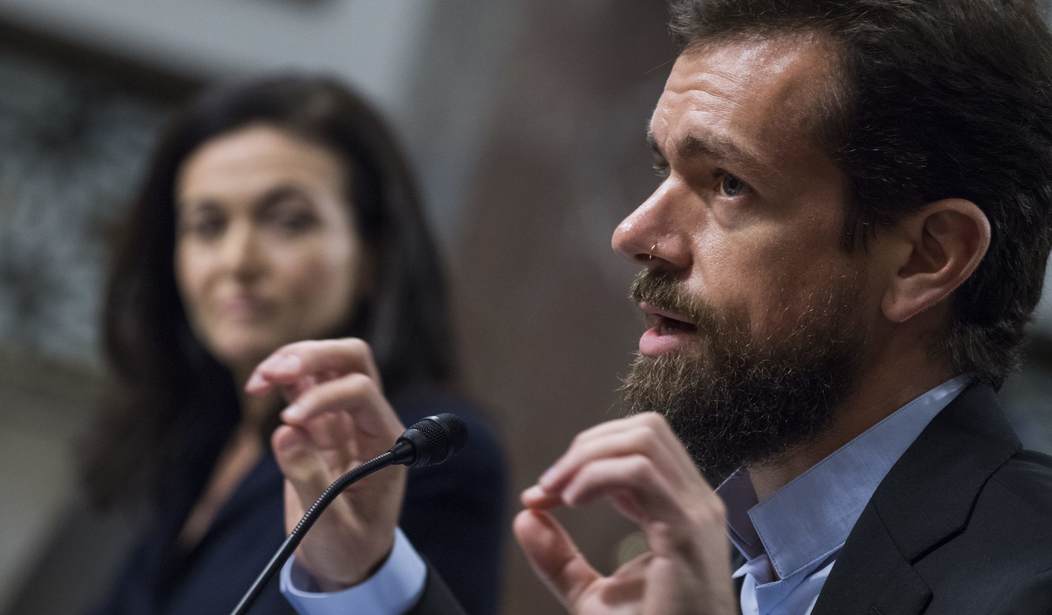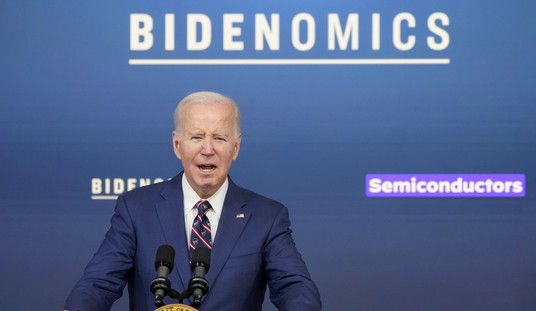On Wednesday, Twitter CEO Jack Dorsey announced that his social media platform would not allow candidates or organizations to promote political messages on his platform. Dorsey acted as though Twitter’s decision is morally superior to Facebook’s decision to allow all candidates to post political ads, regardless of fact-checks.
“We’ve made the decision to stop all political advertising on Twitter globally. We believe political message reach should be earned, not bought,” Dorsey tweeted.
We’ve made the decision to stop all political advertising on Twitter globally. We believe political message reach should be earned, not bought. Why? A few reasons…🧵
— jack 🌍🌏🌎 (@jack) October 30, 2019
He argued that “a political message earns reach when people decide to follow an account or retweet. Paying for reach removes that decision, forcing highly optimized and targeted political messages on people. We believe this decision should not be compromised by money.”
He warned about the “risks” internet advertising poses to politics, suggesting that these risks are uniquely worse than any risks for commercial advertising. “Internet political ads present entirely new challenges to civic discourse: machine learning-based optimization of messaging and micro-targeting, unchecked misleading information, and deep fakes. All at increasing velocity, sophistication, and overwhelming scale.”
While Dorsey acknowledged that “these challenges will affect ALL internet communication, not just political ads,” he claimed that fixing these broader problems outside of the political arena is best done while not also trying to tackle politics.
Then he got in a dig against Facebook. “For instance, it‘s not credible for us to say: ‘We’re working hard to stop people from gaming our systems to spread misleading info, buuut if someone pays us to target and force people to see their political ad…well…they can say whatever they want!'”
Twitter will ban not just candidate ads, but issue ads as well, because they “present a way to circumvent.” He acknowledged the complaint that “our actions today could favor incumbents” (more on that below), but he argued that “many social movements reach massive scale without any political advertising. I trust this will only grow.”
“In addition, we need more forward-looking political ad regulation (very difficult to do). Ad transparency requirements are progress, but not enough. The internet provides entirely new capabilities, and regulators need to think past the present day to ensure a level playing field,” Dorsey added. He announced the final policy will come on November 15 and go into effect on November 22.
“A final note. This isn’t about free expression. This is about paying for reach,” Dorsey concluded. “And paying to increase the reach of political speech has significant ramifications that today’s democratic infrastructure may not be prepared to handle. It’s worth stepping back in order to address.”
There are at least five major problems with this policy.
1. False moral superiority
Dorsey had many reasons to impose this kind of blanket ban, but he decided to frame the issue as one of moral superiority over Facebook. He suggested that Facebook’s policy of allowing all candidates to buy ads undercuts the platform’s efforts to stop spreading misleading information. While this may be true, Facebook has decided not to assert itself as the arbiter of truth in politics — a wise and humble decision in America’s politically-charged culture.
Social media platforms are facing immense pressure from governments, regulators, and political commentators. Liberals demand Facebook and Twitter combat misinformation and “hate speech” — which they often associate with conservative positions — while conservatives complain that their voices are being silenced on these platforms. There is no clear surefire solution to this knotty issue.
Facebook and Google have been slapped with humongous fines by European and other governments. These Big Tech companies are far better equipped to deal with such fines than Twitter is, so it makes sense that Twitter is trying to take the easy way out, cutting off all political advertising on its platform.
Rather than acknowledging the thorny issues and Twitter’s precarious position, Dorsey framed his decision as a morally superior stance.
2. Helping incumbents
Dorsey rightly admitted that critics will claim the new policy helps incumbents. People who hold political office have a huge advantage over candidates who would challenge them for their seats. Voters likely already know who the incumbent is, while challengers have a long uphill climb to just make themselves known to voters.
Despite much handwringing about “money in politics,” political advertisements provide an excellent opportunity for largely unknown challengers to get their names out there and actually have a realistic shot at defeating incumbents. Thanks to the Supreme Court decision Citizens United v. FEC (2010), Americans have the right to band together, raise funds, and spent money to advocate for causes they believe in.
Political advertising can help level the playing field, but Twitter has decided to remove this method of giving people a voice. Dorsey’s suggestion that “social movements reach massive scale without any political advertising” is no solution.
Yes, massive social movements have grown thanks to platforms like Facebook and Twitter. But these movements grow largely because people can use social media to co-ordinate over vast distances, realize there are more people concerned about an issue, and band together. Social media allows politics at a larger scale — but these massive movements are very different from local and state elections, where political and issue ads are most necessary.
The very kind of political advertising Dorsey condemns is exactly the kind of thing that massive social movements do not replace. Social media advertising creates a new avenue for concerned citizens and candidates to target audiences in their area and boost name recognition for a candidate or support for an issue. Massive disjointed social movements are no answer to the loss of this tool.
3. What makes an issue political?
Dorsey announced that Twitter would not just ban candidate ads but also issue ads, by which he means advertising on issues Twitter deems to be political or of national importance. That raises the thorny question: “What makes an issue political?”
If a group of concerned mothers wants to oppose Drag Queen Story Time, for instance, could they do so by purchasing ads on Twitter? Perhaps an ad for a specific candidate or a specific bill focused on that issue would be out of bounds, but what if the mothers just wanted to raise awareness that not everyone supports drag queens reading to children?
Twitter’s policy will likely present a definition of what does and does not count as political, but gray areas are almost certain to arise.
4. “Earned” social media
Dorsey rightly noted that Twitter’s decision to ban political ads is not about free speech but about “paying for reach.” He also declared, “We believe political message reach should be earned, not bought.”
He was suggesting that there is something untoward about politicians and issue groups buying ads on social media to spread their messages. But voters are often so focused on the top of the ticket — the presidential race, U.S. House, U.S. Senate, and governor races — that they neglect to delve into local races and ballot initiatives. Social media allows for candidates and those pushing ballot initiatives to get a message to a specific targeted audience in a limited area. Often, the only exposure a voter will get to a local candidate is an ad. Even if a voter knows about a ballot initiative, he or she is unlikely to be familiar with the case against it — here, too, a targeted social media ad performs an important public service.
Paid ads can perform an important public service by alerting voters who are obsessed with the big national issues to the existence of local candidates and causes.
5. What about news?
If political ads are banned on Twitter, what about right-leaning or left-leaning news outlets and their often biased stories on political issues? This is likely to be a thorny gray area for Twitter’s new rules.
Twitter already requires news outlets to prove their veracity before being able to purchase ads, but the company will have to decide whether or not to allow political news outlets to advertize on the platform under the new rules.
If every news outlet will be able to advertise and be able to “promote” certain stories with a political bias, that could be an effective work-around of the new rules on political issue ads. But in order to prevent this, Twitter will either have to prevent news outlets from advertising or prevent them from promoting political stories. That again raises the issue: what counts as political?
Jack Dorsey seems to think he has struck the grand bargain. Rather than allowing all politicians to pay for ads like Facebook does — inspiring angry criticism from Sen. Elizabeth Warren (D-Mass.) — Twitter will ban all political ads, and Dorsey has decided to be morally superior about it. But this is not the grand solution he thinks it is, and he needs to remove the chip from his shoulder.
Follow Tyler O’Neil, the author of this article, on Twitter at @Tyler2ONeil.









Join the conversation as a VIP Member